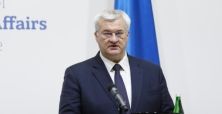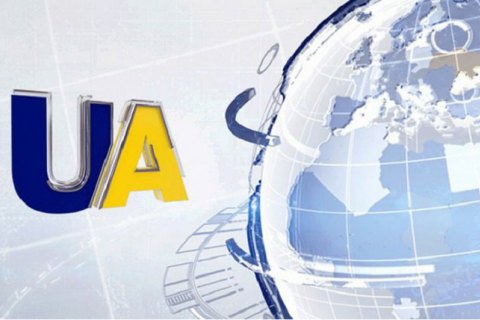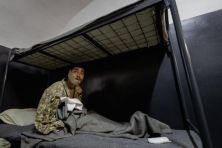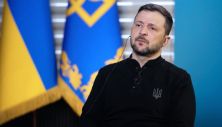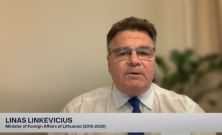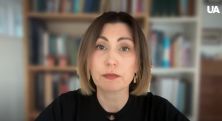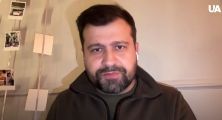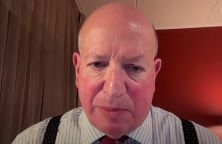Speech by Oleksiy Matsuka, editor in chief, as part of “Establishing truth and enabling accountability: the role of journalists in uncovering human rights abuses and international crimes in times of war” panel, organized by Office of the OSCE Representative on Freedom of the Media and Article 19 in Warsaw on September 30.
FREEDOM is a brand of Ukrainian foreign broadcasting company is a state media in Ru En Arabic languages.
We worked under the UATV logo before – but since the war start change our slogan and logo. We implemented special measures.
So I see the incorrect my title – UATV now renamed as a FREEDOM. Anyway the system of foreign media broadcasting is always complex bureaucracy as well as public TV in different countries.
The question for me was a my personal experiences of covering the war, the challenges I’ve faced and how I understand my role as journalist and editor who covering the war.
I think to all of these questions there is one answer and one word – mobilization.
Is not about Kremlin mobilization but it’s about our – media, humanitarian and existential mobilization.
The mobilization was what made the war truly tangible throughout Ukraine and now in Russia.
We went through this already in January – when mobilization suddenly became real for my neighbors, friends, people I knew from childhood in Donetsk in Luhansk and all Donbas. They are now criminals although they did not want go to the Putin war. They Surrendered to Ukraine but faced crime accusations.
The work with this category of citizens is the task of human rights activists and I hope they are here for the meeting in Warsaw to devote more time to this problem.
After all, Putin is mobilizing the Crimean Tatars, the residents of Kherson and people from the other occupied territories. But they are all Ukrainians as well as people from Donetsk or Lugansk and they do not want to fight against our / their country.
This is a big part of my media reporting that you asked about.
And I see now – even those who were unwilling or unable to accept the reality of war – they are now have of a sense of solidarity and drawn into it. I mean proUA citizens from NGCA.
Therefore, to understand the victims of the war is important. I cannot expect count the categories of such victims. But these are not two or three, but dozens of sides that have been suffering for all 8 years in eastern Ukraine and now in the south after Putin’s invasion.
This is the main focus of my media work when I work in the field.
I will honestly say in what position I myself am when I am the frontline: in case of danger, I freeze stay on one place and try to concentrate on my breath.
Вut I can leave and be saved. Hundreds of thousands are not. They live like that. They survive. Breathing doesn’t help.
I am no longer in Donetsk and Luhansk and even now I’m not in Bakmut but a few days in Warsaw. I cannot show by my example what it means to resist in the fields inside Horlivka for example.
But I know how to resist in the media during the real real war.
notwithstanding drones are hunting us in donbas when russians find our starlinks
Another level – the bots are hunting us online. Humiliation, accusations, persecution, blackmail – all this has become the norm for people like me.
Online web sources and FB FREEDOM are under the attack from fake accounts and companies. And the Meta corporation is inactive.
My message – independent media during the war is possible and necessary.
But the very concept of media independence has now become different.
When I see reports in one western prepaid international news agency that the people of Kherson need to choose their future in five days, I have a question – is this really an independent media? Or is it a symbol of quality and standards? If editors and journalists do not understand the depth of context?
I want to quote their background for the news – ‘Five days of voting is taking place to determine the future of the Luhansk, Kherson, Donetsk, and Zaporizhzhia regions’ It sounds like people in Kherson have rights. It’s a mistake and biased back for this news agency.
So the previous approach to standards sometimes looks like are the tools of mass murder, occupation and colonization now. Or simply say – Justification of crimes.
Or another example – is sociological reports that are provided by Russian companies.
Now I want to say to our audience an update to the standards is required and we can start a discussion about it.
For example – if you know about the preparation of some margin groups in Russia that are ready to burn military registration centers or Russian government offices? And they trust you and invite you to film this process. What is your plan for that and how does this correspond with your media standards (not blog, not small outlet but real TV).
I want to use this panel discussion and refer to Russians and our citizens on NGCA – send us exact information and we will cover your stories of resistance inside Russia, inside the occupied Crimea and Donbas- we will do it without harm to you. I promise you can trust journalists, not propagandists. That means new media standards! The Freedom channel exists for this. A lot of people understand in Russia and say to me – Look, destroying the criminal state and system in Russia is a manifestation of patriotism today.
UA and international media should be ready to show for RU-speaking audiences – you are not alone. Unite in groups, and create teams.
Democracy and solidarity will win. And I want to stop remembering the slogan of WP – Democracy Dies in Darkness. Russia is in the dark today.
